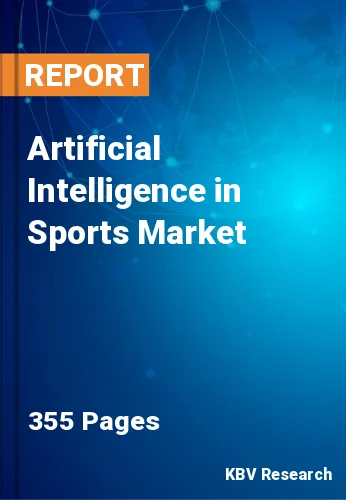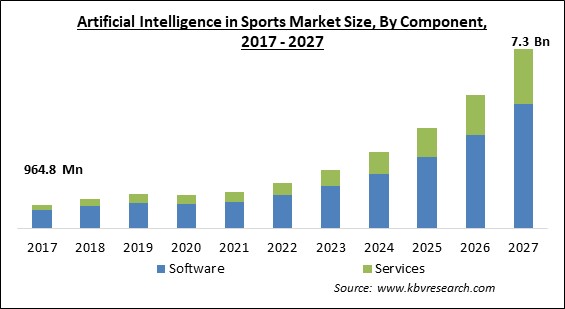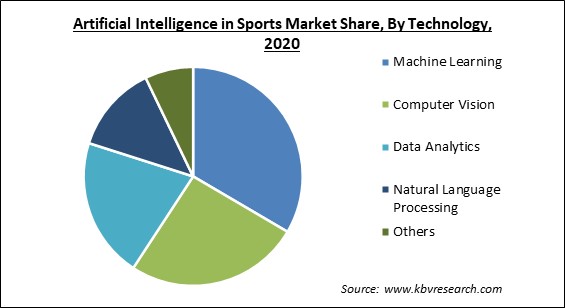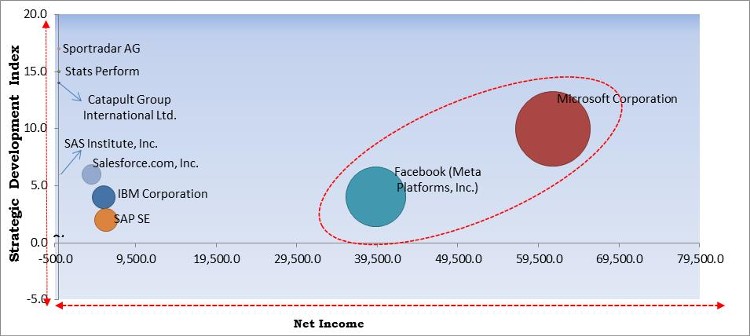
The Global Artificial Intelligence in Sports Market size is expected to reach $7.3 billion by 2027, rising at a market growth of 30.7% CAGR during the forecast period.
Artificial Intelligence (AI) is mostly used in the sports industry to track player performance and to improve the player's health by making injury-prevention recommendations. In addition, AI and machine learning are being used in a variety of sports industry applications to improve sports planning, ranging from chatbots to network vision concepts. In the sports sector, AI is used in a variety of ways, including computer vision, marketing, automated journalism, and wearable technologies. Artificial intelligence (AI) is a term that refers to technology that mimics human functions and, in many cases, uses machine learning to learn from data how to outperform these jobs. It aids coaches and analysts in making better sports decisions.
Some of the growth catalysts for the market are an increase in demand for player monitoring and tracking data, as well as a growing desire for chatbots and virtual assistants to communicate with fans. Additionally, the growing demand for real-time data analytics is having a beneficial impact on the rise of AI in the sports industry. Furthermore, the rising demand for AI for making future predictions would play a major role in boosting the adoption rate of AI in the sports industry. On the other hand, some of the obstacles to the growth of AI in the sports industry are the scarcity of qualified & skilled experts, and high installation & maintenance costs.
Artificial intelligence in sports is gaining traction across the world, with applications ranging from post-game analysis to in-game activity to the fan experience. In addition, AI is also being employed to help gamers improve their performance. Apps like HomeCourt, ESPN Player, and MaxOne (M1) AI SmartCoach combine computer vision and machine learning to evaluate basketball players' abilities and provide them with an appropriate learning environment. Athletes' performance data are also recorded to help them understand the areas where they have the most potential to excel as well as the areas where they still need to develop.

The COVID-19 outbreak is expected to have a favorable impact on the artificial intelligence sector in sports. This is due to the fact that spectators are getting a personal look at the future of virtual contact sports, and some are beginning to embrace it. Moreover, because of a spike in COVID-19 cases, most sports stadiums have reduced the number of spectators and have adopted virtual spectatorship. Further, AI-powered equipment can not only stream live sporting games without the need for a camera operator, but it can also provide statistical models, tactical analysis, and prediction analytics to help coaches maximize their players' potential. Furthermore, COVID-19 has prompted many sports fans to think about player health and safety in a whole new and intense way.
In recent years, emerging technologies such as artificial intelligence (AI), big data, and the Internet of Things (IoT) have become essential components of sport, and are now being used on a regular basis, particularly in team sports, for a variety of applications like monitoring movement patterns, which reveal important results about sport performance. In addition, AI analytics is assisting in the quantification of these outcomes as well as the kinematic profile of players who are employing global positioning systems (GPS). These devices have been classified as a viable instrument for assessing external load in intermittent sports, with the ability to capture real-time data on time, speed, position, distance, altitude, and direction, making them common in team sports analysis.
The demand for social media virtual assistants is rapidly increasing, as they do all of the duties of a social media manager. They also handle time-consuming social media activities so that athletes may concentrate on their training and team management. In addition, as players' and sports' popularity has grown, it has become increasingly difficult for them to communicate with each fan. As the majority of the revenue comes from fans, this can result in significant losses for the team's management and players. Virtual assistants can respond to comments, look up hashtags, improve their content, and send follow-up communications in this situation.
Artificial intelligence in sports comes with a hefty price tag. In addition, the fact that it is used in nearly every aspect of sports management makes it much more costly to maintain. Hence, various sports organizations in many countries are still relying on legacy systems to continue to provide value to the fans. Also, technologies like AI come with some demerits also. The industry players need to check the possibility of data leak and other privacy concerns that can undermine reputation of any sports organization. Moreover, as technology advances, it will be necessary to update and upgrade both the software and hardware of artificial intelligence technology on a regular basis. The cost of upgrading these advanced technological systems is quite significant. Further, the expense of maintaining and repairing an AI machine is also a consideration.

Based on Component, the market is segmented into Software and Services. The Services segment obtained a significant revenue share of the Artificial Intelligence in Sports Market in 2020. This is due to an increase in the number of trained workers and the need to maintain the security and functionality of the software, the service segment is witnessing a high adoption rate among many sports entities.
Based on Game Type, the market is segmented into Football, Cricket, Basketball, Tennis, Baseball, and Others. The Cricket segment procured a significant revenue share of Artificial Intelligence in Sports Market in 2020. In cricket, artificial intelligence (AI) is utilized to improve the game's strategy. Machine Learning can be used to properly forecast match results. Moreover, AI is currently being applied in the Umpire Decision Review System (UDRS), Duckworth Lewis, and run-out analysis. AI can also be utilized to create indoor or closed stadiums, ensuring that the game can continue even if the weather is terrible.
Based on Application, the market is segmented into Game Planning, Game Strategies, Performance Improvement, Injury Prevention Sports Recruitment, and Others. The Performance Improvement collected a promising revenue share of the Artificial Intelligence in Sports Market in 2020. AI is also being employed to improve player performance. Basketball players' skills are assessed using Computer Vision and Machine Learning via apps like HomeCourt, providing them with a suitable platform to progress. The recording of these athletes' performance indicators is not only reliable, but it also aids the players in determining where they have the greatest potential to excel and where they still need to grow.
Based on Deployment model, the market is segmented into On-premise and Cloud. In 2020, the Cloud segment procured the largest revenue share of Artificial Intelligence in the Sports Market. Biomedical sensors collect data on an athlete's eating, sleeping, and training habits and store it on cloud servers. The various team members then use this information to come up with ways to improve their overall health, predict impending injury, and assist them in achieving peak performance. On and off the field, various sports organizations and teams have been utilizing cloud solutions technology, which allows them to analyze enormous volumes of data in a single platform and make appropriate decisions and changes.
Based on Technology, the market is segmented into Machine Learning, Computer Vision, Data Analytics, Natural Language Processing, and Others. In 2020, the Machine Learning segment garnered the maximum revenue share of Artificial Intelligence in Sports Market. Machine learning helps give accurate data for player recruitment and performance, owing to its reliance on technology. Furthermore, machine learning gives researchers and innovators in the sports and allied industries technical assistance in expanding digitalization and automation.
| Report Attribute | Details |
|---|---|
| Market size value in 2020 | USD 1.3 Billion |
| Market size forecast in 2027 | USD 7.3 Billion |
| Base Year | 2020 |
| Historical Period | 2017 to 2019 |
| Forecast Period | 2021 to 2027 |
| Revenue Growth Rate | CAGR of 30.7% from 2021 to 2027 |
| Number of Pages | 355 |
| Number of Tables | 583 |
| Report coverage | Market Trends, Revenue Estimation and Forecast, Segmentation Analysis, Regional and Country Breakdown, Competitive Landscape, Companies Strategic Developments, Company Profiling |
| Segments covered | Component, Game Type, Application, Deployment Model, Technology, Region |
| Country scope | US, Canada, Mexico, Germany, UK, France, Russia, Spain, Italy, China, Japan, India, South Korea, Australia, Malaysia, Brazil, Argentina, UAE, Saudi Arabia, South Africa, Nigeria |
| Growth Drivers |
|
| Restraints |
|
Based on Regions, the market is segmented into North America, Europe, Asia Pacific, and Latin America, Middle East & Africa. In 2020, North America emerged as the leading region in the overall Artificial Intelligence in Sports Market. This is attributed to an increase in AI adoption by major sports such as basketball, baseball, football, and tennis. Moreover, the artificial intelligence in sports market size is being driven by an increase in sports competitiveness across nations for higher positions.
Free Valuable Insights: Global Artificial Intelligence in Sports Market size to reach USD 7.3 Billion by 2027

The major strategies followed by the market participants are Partnerships. Based on the Analysis presented in the Cardinal matrix; Facebook (Meta Platforms, Inc.) and Microsoft Corporation are the forerunners in the Artificial Intelligence in Sports Market. Companies such as IBM Corporation, SAP SE and Salesforce.com, Inc. are some of the key innovators in the Market.
The market research report covers the analysis of key stake holders of the market. Key companies profiled in the report include Catapult Group International Ltd., Facebook (Meta Platforms, Inc.), IBM Corporation, Microsoft Corporation, Salesforce.com, Inc., SAP SE, SAS Institute, Inc., Sportradar AG, Stats Perform, and Trumedia Networks.
By Component
By Game Type
By Application
By Deployment Model
By Technology
By Geography
The artificial intelligence in sports system market size is projected to reach USD 7.3 billion by 2027.
Growing demand for Chatbots and Virtual Assistants to Interact with Fans are driving the market in coming years, however, high operating costs limited the growth of the market.
Catapult Group International Ltd., Facebook (Meta Platforms, Inc.), IBM Corporation, Microsoft Corporation, Salesforce.com, Inc., SAP SE, SAS Institute, Inc., Sportradar AG, Stats Perform, and Trumedia Networks.
The Software segment acquired maximum revenue share in the Global Artificial Intelligence in Sports Market by Component in 2020, thereby, achieving a market value of $5.0 billion by 2027.
The Football segment dominated the Global Artificial Intelligence in Sports Market by Game Type in 2020, and would continue to be a dominant market till 2027.
The North America is the fastest growing region in the Global Artificial Intelligence in Sports Market by Region in 2020, and would continue to be a dominant market till 2027.
Our team of dedicated experts can provide you with attractive expansion opportunities for your business.
